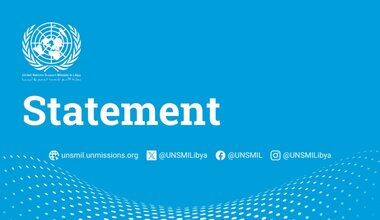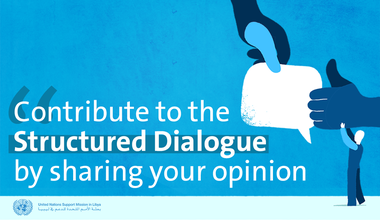Statement by UN High Commissioner for Human Rights Zeid Ra’ad Al Hussein at the end of visit to Libya
Photos for the visit to Tripoli / video report for the visit
Geneva, 12 October 2017 - No UN High Commissioner for Human Rights ever managed to make an official visit to discuss the human rights situation in Libya during the time of Muammar Gaddafi or in the years following the end of his dictatorial regime.
So even though the security situation meant I could not announce in advance my brief official mission to Libya on Tuesday, I was at least able to make the visit and hold a round of useful discussions with Prime Minister Fayez Serraj, the Ministers of Justice and Interior, and the Head of the Department responsible for managing migration detention centres. I was also able to pay brief visits to one of the country’s main prisons and a camp for displaced people. My trip was further informed by a very useful meeting with Libyan civil society and women human rights defenders.
I wish to thank the Prime Minister for inviting me to Libya, and for the hospitality I received while I was in Tripoli. I also appreciate the assistance provided by the Special Representative of the Secretary-General Ghassan Salamé, and the United Nations Support Mission in Libya (UNSMIL).
The visit was very short but potentially important. It was intended to stimulate, and hopefully sustain, not just a productive dialogue but also concrete actions which could ultimately lead to significant improvements in the lives of the people of Libya.
Clearly, in a single day, we could not begin to cover all the human rights issues affecting the country, so I chose to focus on arbitrary detention, torture and other grave violations which are particularly urgent.
During the meetings, officials repeatedly highlighted Libya’s commitment towards ensuring the protection of human rights. I welcome these commitments, and note with appreciation that efforts are being made to facilitate the visits of Special Procedures mandate holders.
Officials also highlighted the significant challenges in Libya due to years of violence and instability, a near-breakdown in the rule of law, the proliferation of armed groups, a deteriorating humanitarian situation, the internal displacement of hundreds of thousands of people, and severe disruption to the provision of basic services to the population.
I appreciate the magnitude of these challenges, and have heard how they affect the Government’s ability to undertake and fulfil its duties. At the same time, I have put forward suggestions in areas where progress can be progressively made if appropriate action is taken.
Despite the great hopes following the 2011 revolution, the human rights situation in Libya continues to be marked by widespread abuses and violations perpetrated by all sides to the conflict with complete impunity.
Thousands of people are held arbitrarily in detention centres across the country, some since the 2011 armed conflict, many subjected to torture and ill-treatment. Armed groups unlawfully kill and hold hostage civilians and combatants. Civilian men, women and children are killed and injured every week by the indiscriminate use of weapons. And yet, these aspects of the human rights situation in Libya rarely find themselves in the headlines.
Internally displaced people and civil society representatives painted a stark picture of the grave abuses carried out by armed groups and the impunity that they currently enjoy. The actions of armed groups hinder meaningful progress towards stability, development and peace in the country.
In many of my conversations, including with the Prime Minister, the Minister of Justice, and the Minister of Interior I raised the dire situation in detention centres across the country. I was pleased to see their commitment to work with the United Nations and others towards the full implementation of international standards, such as the Mandela Rules. I directly raised with officials the need to make rapid progress in screening the files of pre-trial detainees to ensure that either trials proceed or the detainees are released. I also raised the need for accountability within the penitentiary system and called for human rights monitors to be given unfettered access to places where suspects and convicted prisoners are held.
Individual centres, such as the Mitigia detention centre, are of particular concern given the horrific reports emerging from them. The situation there needs to be addressed urgently, as do other facilities where abuses are endemic.
I call on the Government to formulate a plan of action to end arbitrary detention in the country, which would involve the transfer of detainees to prisons under the Judicial Police of the Ministry of Justice, the release of those in prolonged detention against whom no evidence of criminal conduct has been presented or whom are held without legal basis, and the screening of all detainees,
The consequences of impunity could not have been more starkly demonstrated when talking to human rights defenders. Human rights defenders told me about intimidation and attacks against them and the lack of protection and impunity for such attacks. I heard how women human rights defenders have faced virulent abuse and intimidation, and how civil society activists have been abducted and killed by armed groups. Many have been forced to flee or to stop their work.
Still, so many Libyans continue to bravely speak out and work in the name of human rights. I salute their courage, and my Office will seek to stand with them as they continue their work.
The situation of human rights defenders reflects a grave lack of protection for many groups in vulnerable situations in Libya. I spoke to internally displaced people from the Taweghan community who told me about the poor conditions and limited protection they endured while residing in camps over the past six years. Since the signing of an agreement between the Tawerghan and Misratan communities on a possible return, and the approval of the agreement by the Government in June, they say there has been little progress towards fulfilling their right to return to their homes. There is a need for positive signs soon to ensure the sustainable return of the Tawerghan people to their homes in safety and dignity.
I also raised with the authorities the distressing situation of migrants in Libya, including directly with the Prime Minister, the Minister of Interior, and the head of the Department responsible for migration.
I call on the Government to establish alternatives to detention in Libya, to halt the practice of arbitrary detention, and to ensure accountability for the abuses perpetrated against migrants in detention centres. The authorities indicated that one of the detention centres in Surman, where there have been serious allegations of sexual abuse, has been closed. We intend to work with the Government to confirm the closure.
The human rights challenges in Libya are massive, but they are not insurmountable. The large-scale near-collapse in the justice system, the power and influence of armed groups, and the many challenges faced by the Government are real. But the Government can and should lead. It can begin combating the practice of arbitrary detention and taking back the powers given to armed groups. The situation in detention centres can be addressed. A concerted effort by the Government, and all stakeholders, including the United Nations and the international community, can move the needle and improve the situation.
It is crucial that the challenges are addressed and that there is a constant effort to make progress – no matter how small, no matter how difficult - towards accountability. Everyone I met during the visit, from the Prime Minister himself, the Ministers, civil society, women human rights defenders to those in the IDP camp, wanted improvements in the implementation of the rule of law.
The Special Representative of the Secretary-General and I share the conviction that human rights, the re-establishment of the rule of law, and the need to combat impunity must be part and parcel of the political process and will underpin a sustainable political settlement in Libya.
I am optimistic that the openness of the Government, the implementation of the Plan of Action announced by the Secretary-General and his Special Representative last month in New York will bear positive and concrete results in our respective efforts to support an improvement of the human rights situation in Libya. We will continue to offer our support towards this end.
 United Nations Peacekeeping
United Nations Peacekeeping UN
UN









